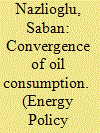|
|
|
Sort Order |
|
|
|
Items / Page
|
|
|
|
|
|
|
| Srl | Item |
| 1 |
ID:
186433


|
|
|
|
|
| Summary/Abstract |
Growing concerns about long-run equilibrium in the oil market have focused on understanding the time path of oil consumption across countries. This study examines the convergence of oil consumption across the largest oil consumers. To this end, we employ the historical oil consumption data dating back to 1890 by benefiting from the newly proposed convergence concepts, including relative/club convergence and weak -convergence, in addition to the conventional β-convergence notion. The empirical results provide new and insightful findings. First, considering common factors in the dynamics of oil consumption leads to convergence. Second, the overall evidence of absolute convergence has been at work among countries mainly before the great depression 1890–1929, while divergence occurs after the mid of 1990s. Third, the divergence observed over the last decades persists even after accounting for either a relative or weak form of convergence, supporting the primary role of the current dynamics in world oil markets. Divergence calls for stricter energy transition policies. Moreover, the clustering algorithm identifies unique convergent clubs, indicating that a unified energy policy is not tenable.
|
|
|
|
|
|
|
|
|
|
|
|
|
|
|
|
| 2 |
ID:
109700


|
|
|
|
|
| Publication |
2011.
|
| Summary/Abstract |
The purpose of this study is to determine the direction causality between nuclear energy consumption and economic growth in OECD countries. The empirical model that includes capital and labor force as the control variables is estimated for the panel of fourteen OECD countries during the period 1980-2007. Apart from the previous studies in the nuclear energy consumption and economic growth relationship, this study utilizes the novel panel causality approach, which allows both cross-sectional dependency and heterogeneity across countries. The findings show that there is no causality between nuclear energy consumption and economic growth in eleven out of fourteen cases, supporting the neutrality hypothesis. As a sensitivity analysis, we also conduct Toda-Yamamoto time series causality method and find out that the results from the panel causality analysis are slightly different than those from the time-series causality analysis. Thereby, we can conclude that the choice of statistical tools in analyzing the nature of causality between nuclear energy consumption and economic growth may play a key role for policy implications.
|
|
|
|
|
|
|
|
|
|
|
|
|
|
|
|
| 3 |
ID:
104976


|
|
|
|
|
| Publication |
2011.
|
| Summary/Abstract |
The increasing co-movements between the world oil and agricultural commodity prices have renewed interest in determining price transmission from oil prices to those of agricultural commodities. This study extends the literature on the oil-agricultural commodity prices nexus, which particularly concentrates on nonlinear causal relationships between the world oil and three key agricultural commodity prices (corn, soybeans, and wheat). To this end, the linear causality approach of Toda-Yamamoto and the nonparametric causality method of Diks-Panchenko are applied to the weekly data spanning from 1994 to 2010. The linear causality analysis indicates that the oil prices and the agricultural commodity prices do not influence each other, which supports evidence on the neutrality hypothesis. In contrast, the nonlinear causality analysis shows that: (i) there are nonlinear feedbacks between the oil and the agricultural prices, and (ii) there is a persistent unidirectional nonlinear causality running from the oil prices to the corn and to the soybeans prices. The findings from the nonlinear causality analysis therefore provide clues for better understanding the recent dynamics of the agricultural commodity prices and some policy implications for policy makers, farmers, and global investors. This study also suggests the directions for future studies.
|
|
|
|
|
|
|
|
|
|
|
|
|
|
|
|
|
|
|
|
|